Striking teachers get locals' support for today's action
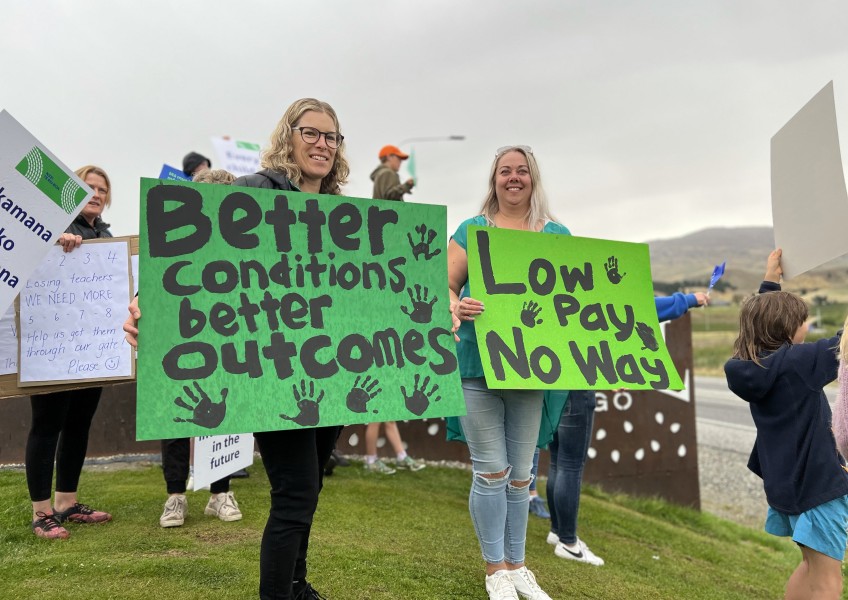
Remarkables Primary School teacher Stephanie Dolphin reckons her sign pretty well sums up the the sentiment that has brought her and her colleagues to Cromwell’s picket line, “Sorry for the disruption but your kids are worth it”.
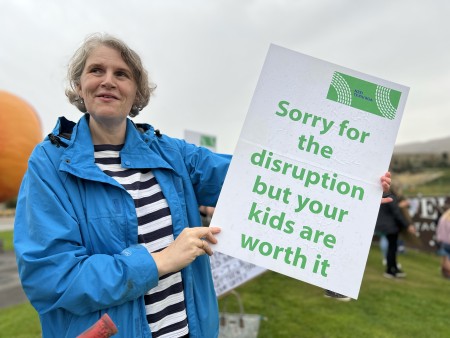
Remarkables Primary School teacher Stephanie Dolphin on the picket line in Cromwell today.
For the first time ever, teachers spanning primary and secondary schools and kindergartens have collectively walked off the job in Wānaka, Queenstown and Cromwell today.
Hundreds of local teachers lined highways with banners and signs, and, for many, their own children in tow, adding their voices to those of approximately 50,000 of their education colleagues taking strike action around the country over stalled negotiations with the Ministry of Education.
Under Cromwell's Big Fruit, her voice competing with beeps of support from passing traffic, Goldfields Primary School teacher Nic Hale, who’s the Central Otago union representative for New Zealand Educational Institute Te Riu Roa, says teachers left their classrooms today to demand of the government better conditions for teachers.
But she had a clear message for parents and caregivers as well: Better conditions for teachers means better outcomes for tamariki too.
“We don’t want to be doing this (picketing). This is out of our comfort zone. We want to be in the classroom teaching children, doing what we absolutely love. But we can’t because the system is broken and they (the government) are not listening."
Ms Hale says she’s a parent herself, and she knows the frustration of having her kids at home when they should be at school.
“But you can’t blame the teachers...Each child is getting a rough deal in the system we’ve got right now...They’re not actually getting quality teaching, and it’s not OK. We have got a passion and we love our job, but we are actually stretched.”
Teachers are asking for smaller class sizes, additional support staff to help children with behavioural and learning challenges, and more money into classrooms in general, she says.
“Our classrooms are not resourced well enough. Who do you think is buying a lot of that stuff that our kids use in their classrooms? Teachers often use their own money and they’re not being paid enough as it is.”
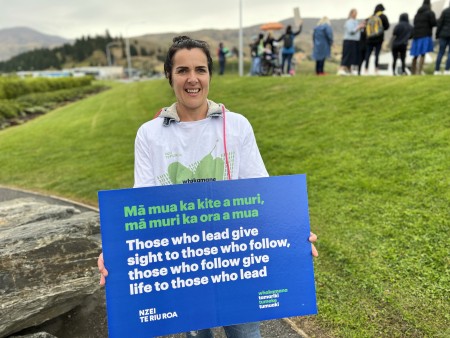
'This is out of our comfort zone. We want to be in the classroom teaching children, doing what we absolutely love': Goldfields Primary School teacher Nic Hale.
Too many of her colleagues are leaving for more lucrative jobs offshore or leaving the profession altogether, feeling dispritied, undervalued and overworked, she says.
A starting salary for a primary school teacher is little more than minimum wage, she says.
“How are we going to retain our teachers, when they've got student loans, coming out with a degree and they’re on little more than minimum wage? They would be better off going and working in a supermarket.
“Our teachers are leaving to Australia and the UK. One teacher who spoke this morning said she was paid more than she is now in Australia 20 years ago.”
Plus, Ms Hale says the job description only seems to be getting tougher – teachers have become social workers as well as educators, while principals are caretakers, accountants, and business managers, their time increasingly divvied up away from an education focus.
“This is what we are dealing with.”
There’s also issues of pay parity between teachers – Ms Hale says she holds a leadership position in her school, but isn’t paid as much for it as a relevant counterpart at a secondary school.
“How is that fair?”
Meanwhile a head teacher at a kindergarten (unlike other early childhood teachers, kindergarten teachers negotiate their pay agreement with the government) gets just $50 extra a week, she says.
It potentially adds licensing, rostering, roll management, financial and regulatory responsibilities to their existing day-to-day teaching work, all for $10 a day.
Queenstown
Through the gorge, lining Frankton Road, 150 teachers from the Whakatipu Basin united together under signs and banners asking for more support from the government to do their jobs, and receiving encouraging honks from passing cars.
Like their colleagues in Cromwell, they’re asking for better conditions, pay and more learning support, because “you can't be the best teacher you can be” in the current system, Phil Harrison, a teacher at Remarkables Primary, says.
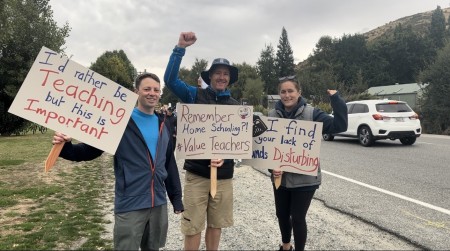
'Remember homeschooling?': Remarkables Primary School teacher Phil Harrison (middle) wants people to remember the value of teachers.
As the organiser of the Queenstown event, Mr Harrison spoke of what it’s like being a teacher in today's environment. This year, he has 27 pupils in his direct care, “which is considered a small class nowadays”, he says. Many of his Remarkable’s Primary colleagues have more than 30.
“If it's one teacher with 30 kids, that's a lot to ask for each teacher. Learning needs are going up and conditions are incredibly difficult in terms of how much we have to do."
It’s a situation that’s compounding as burnt-out teachers leave the industry, causing class numbers to keep rising.
“We're losing teachers because the conditions are really, really difficult. It’s not an attractive job to go into.
“I've seen a lot of the stats about you can earn the same in Kmart as you do as a beginning teacher.”
Mr Harrison’s been teaching for eight years and it’s his passion - “a rewarding job” - but he says they need the government to come to the table.
“I know that all my colleagues who are out here striking, they want to be the best teacher they can and they want to do the best for the kids. But it's not really down to us to be able to change that as individuals.”
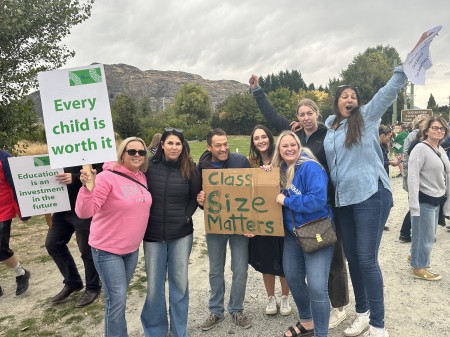
Striking teachers on Frankton Road today - the first time primary, secondary and kindergarten teachers have walked off the job collectively.
Teachers from schools across Queenstown attended, with representatives from Shotover Primary School, Queenstown Primary School, St Joseph’s, Kingsview, and Whakatipu High School, showing just how well supported the strike is.
Mr Harrison’s sign says “remember homeschooling”, drawing inspiration from the pandemic period.
He believes the profession gained a lot more recognition and respect during lockdown when the role of educating was forced onto parents and other caregivers.
“They (parents) were saying ‘wow, I don't know how you do it. I've only got one or two kids and you’ve got 30 kids’.”
Mr Harrison wants to say a big thank you to all the people tooting as they drove past, and to his colleagues and fellow Queenstown teachers for showing up.
“It's really good to get the message out. The government needs to make a change.”
Today’s strike is the second time primary and secondary school teachers have walked off the job on the same day, and the first time kindergarten teachers have joined them.
It’s been organised by the Post Primary Teachers Association and the New Zealand Educational Institute Te Riu Roa unions after pay talks with the Ministry of Education stalled.
Teachers are stressing their pay demands are not about greed - the ministry's offer is below inflation to start, and it doesn't address the critical need to provide a pay rate that will help schools attract and retain talent, they say.
Wellington responds
Addressing thousands of teachers gathered at Parliament in Wellington earlier today, Education Minister Jan Tinette thanked those striking for taking action and committed the government and the ministry to continuing to work with them on their demands.
“I want to say very, very sincerely, thank you for standing up for the kids in this country, for standing up for your conditions.
“I have been where you are. I have stood out there right where you are now and I have protested. I have also been a teacher and a principal and so I absolutely know and value the work that you do."
She’s been in the job for a little more than a month.
“I know that we can do better and I am committed to doing better.
“I know that there are areas that need sorting; I know there are areas like learning support that are completely broken.
“Today, everybody, is your day of action, you are absolutely letting this country know how valuable your job is.
“Tomorrow, we are back at the table. We value you, we see you and we hear you.”
Main image: Cromwell Kidsfirst Kindergarten teachers Aimee Cornforth (left) and Rebecca Win are striking for better pay and work conditions.


























